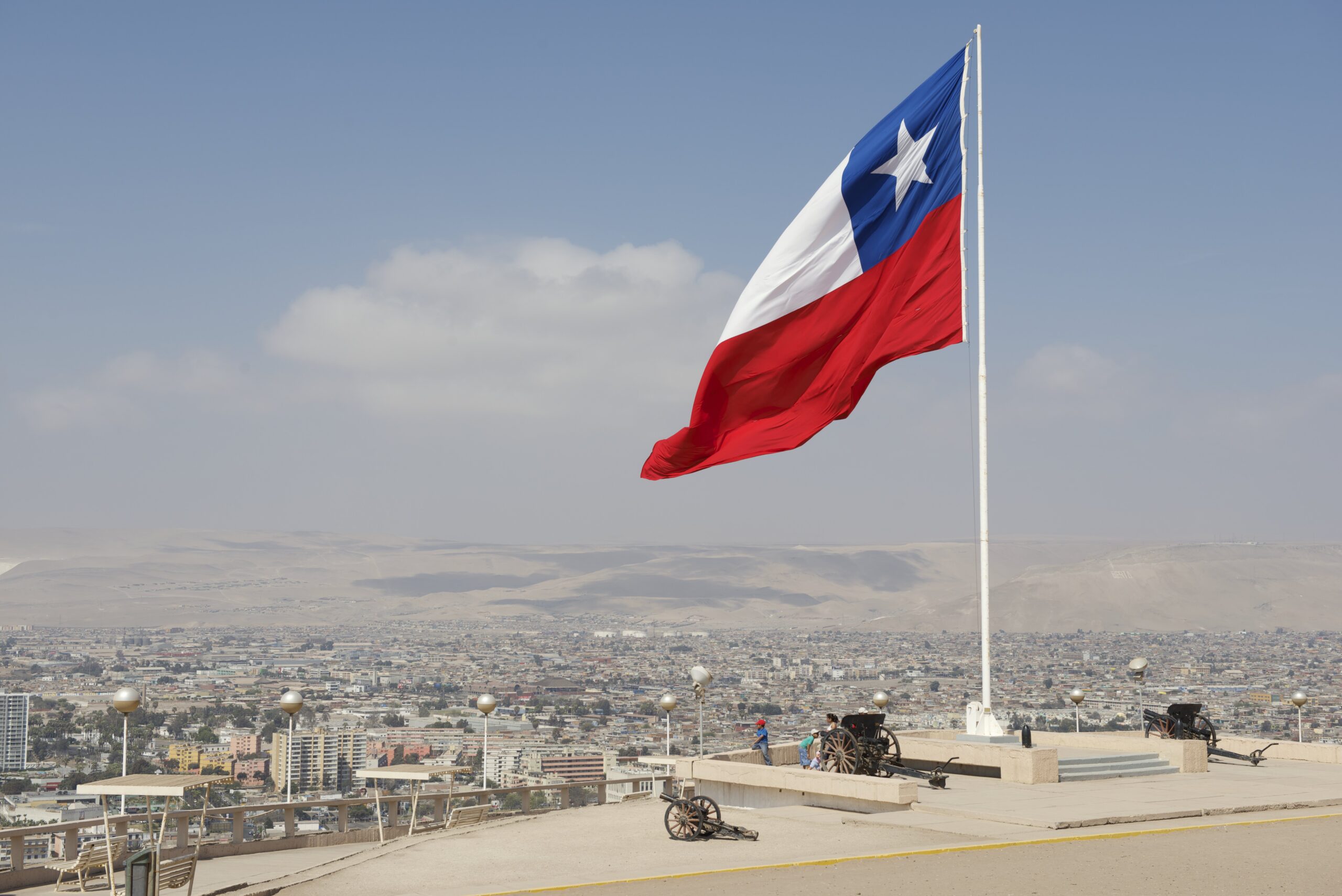In 2022, several local operators filed a collective complaint with various authorities, demanding action at the state level against offshore (and foreign in general) operators. Among other things, they requested the blocking of these operators’ websites within the country.
Now, after three years, the Chilean Prosecutor’s Office has officially announced that no further investigation will be carried out, and the case has been closed without any conclusions, sanctions, or restrictions against foreign operators.
As of today, Chile does not have a regulated gambling market, so this decision is quite expected.
What’s Going On With Gambling in Chile?
Online gambling in Chile is a strange mix of popularity and legal vacuum. Millions of users freely play on foreign operators’ platforms without giving much thought to licenses or regulations. At the same time, there is neither a comprehensive legal framework nor a dedicated regulatory body overseeing the market within the country.
In 2022, several local operators decided it was time to change that. Joining forces, they filed a collective complaint with all possible authorities, calling for action against offshore and international platforms — including blocking access to their websites and restricting their operations in Chile.
Nearly three years have passed. And now, in 2025, the Chilean Prosecutor’s Office has officially closed the case: the investigation has been terminated, the claims dismissed, and no sanctions will be imposed.
For some, this is a blow to efforts aimed at creating a local regulated market. For others, it’s a clear sign that Chile remains one of the few jurisdictions where offshore gambling is not only legal but practically unregulated.
What does this decision mean for players, operators, and the market itself? What long-term consequences could it bring? And why is Chile becoming a new point of interest for global gambling brands? We break it all down in our in-depth analysis.
Who and Why Complained About Offshore Operators?
Local operators, pressured by competitive struggles and the tax burden, became the primary initiators of legal pressure on offshore gambling operators in Chile. In 2022, several large Chilean gambling companies, including well-known players like Dreams SA, Marina del Sol, and Latin Gaming, filed a collective complaint against international platforms, marking an important step in the development of the local market.
Unfair Competition and Tax Losses
Local operators, working within the framework of Chilean law, had to adhere to strict requirements — from paying taxes to complying with safety and player protection standards. Meanwhile, international companies operating in offshore zones were not burdened by such stringent conditions. This gave foreign platforms a significant advantage.
In particular, offshore operators were not required to pay taxes in Chile, allowing them to offer more attractive conditions to players. Furthermore, they could afford more aggressive marketing strategies, offering generous bonuses and promotions, which also attracted the attention of Chilean users. These advantages became a significant obstacle for local operators, who couldn’t compete with international brands.
Local companies, therefore, saw this as a threat to their business and feared they would ultimately be unable to stay competitive in the market. As a result, they began to actively lobby government authorities to restrict the activities of offshore platforms.
Lack of Regulation and Player Safety
One of the key issues highlighted by Chilean operators was the lack of regulatory control over the activities of offshore platforms. In countries with developed regulated gambling markets (such as the UK or Spain), operators are required to follow strict rules regarding player protection, fraud prevention, and combating gambling addiction.
In Chile, however, with its unregulated market, players who turned to offshore sites were exposed to risks: no guarantees of payouts, a lack of control over the security of personal and financial data, and no recourse for assistance in case of problems.
Local operators saw their mission as creating a safer and more secure environment for players. They insisted on the need to protect user interests, claiming that foreign platforms were not held accountable for the consequences of their activities in Chile.
Legal Uncertainty and Legal Problems
A key issue for all participants in the conflict was the question of legal uncertainty. At the time the complaint was filed in 2022, Chile did not have clear legislation regulating online gambling. This meant that neither local nor international operators were required to follow any established standards or licensing requirements.
Local companies argued that the lack of regulation not only created unfair conditions for business but also hindered the creation of an effective and transparent legal environment for players. Without clear control, it was impossible to avoid fraud, illegal activities, and other risks that could harm both users and local operators.
Global Trends and Support from Other Countries
It’s worth noting that the Chilean operators’ demands were not unique. In several Latin American countries, such as Argentina, Peru, and Brazil, there has been strong support for local companies in the fight against offshore platforms. These countries are actively developing legislation to legalize and regulate gambling, creating more favorable conditions for local operators and attracting investments. In this context, Chilean operators also sought to follow a similar approach to protect their interests and not fall behind international practices.
All of this led to the complaint from local companies against offshore operators becoming not only an economic issue but also a political one. The complaint reflected deeper issues regarding market regulation and Chile’s attempts to create a legal framework for online gambling.
Reaction of International Operators
The response from foreign operators to the demands of local companies was somewhat predictable. Many international brands claimed they comply with all international standards and do not violate the laws of other countries, as they offer their services not only to Chilean users but to players around the world. They also pointed out that providing their services in Chile is not illegal since the country does not have clear laws prohibiting online gambling.
Foreign companies essentially argued that they were not violating any rules by acting within the scope of international law and that attempts to limit their activities would only create barriers to the development of a free market.
Timeline of the Conflict: 2022–2025
The process that began in 2022 with a complaint from local operators turned into a prolonged affair, filled with legal and political complications. The timeline of events — from the initial steps to the eventual resolution in 2025 — offers a comprehensive view of how the situation unfolded.
2022: Filing the Complaint and Initial Steps
In mid-2022, several major Chilean operators, including Dreams SA, Marina del Sol, and Latin Gaming, officially filed a collective complaint with the national prosecutor’s office. Their demand was straightforward — to block access to international online casinos and betting platforms operating in Chile without licenses and, in the complainants’ view, in violation of the law.
The complaint also emphasized the tax losses resulting from the lack of oversight of offshore operators. According to local companies, a significant portion of revenue that could have gone to the national treasury was instead flowing abroad, depriving the country of potential tax income.
Furthermore, the local operators argued that offshore companies were violating safety principles by offering Chilean players low-quality or even fraudulent services. This argument was aimed at protecting players and pushing for a safer gambling environment within the country.
2023: Government Response and Legal Disputes
In 2023, the investigation initiated by the prosecutor’s office continued, but progress was slow and uncertain. During this time, international operators began actively defending their position, pointing to the lack of clear online gambling laws in Chile. Many companies argued they were not violating local laws, as they operated under jurisdictions where their activities were fully legal.
Meanwhile, Chilean legislation remained in a state of limbo. Despite repeated appeals from local operators, the government was hesitant to take decisive measures, such as enacting bans or implementing site blocks. Unlike other Latin American countries, such as Brazil and Argentina, which were moving toward regulation, Chile showed no urgency in legalizing or regulating the sector — further deepening the conflict.
2024: Ongoing Review and Lack of New Initiatives
By 2024, it had become clear that the situation was dragging on. The prosecutor’s office continued its work, but as the investigation progressed, it became increasingly apparent that no meaningful outcome would be reached. One of the key factors was the absence of a clear legal framework for online gambling, making it difficult to justify any sanctions against foreign operators.
At the same time, international operators stepped up their efforts to engage with local authorities, lobbying to defend their interests. Legally speaking, their operations did not breach Chilean law, and this became a central argument in their favor. As a result, despite growing pressure from local companies, government circles failed to reach a consensus on how to move forward.
2025: Final Closure of the Case
In early 2025, the Chilean prosecutor’s office officially announced the closure of the case without any findings or sanctions. In its statement, the office noted that further investigation was pointless, as there were no existing laws in Chile capable of regulating the activity of online gambling operators. Unlike countries with regulated markets, such as the UK or Spain — where there are clear gambling laws — Chile had not established similar mechanisms.
The decision was expected, though disappointing for local operators. Amid continued legal uncertainty, many began reevaluating their strategies, realizing that the fight against offshore operators might be futile without a solid legal foundation.
At the same time, foreign operators received a clear signal that their presence in Chile would not be legally challenged, and they could continue attracting players without fear of site blocks or financial penalties.
Why Did the Chilean Prosecutor’s Office Close the Case?
The decision by the Chilean Prosecutor’s Office to end the investigation against offshore operators marked a turning point for the local gambling market. And while the decision came as a surprise to some, from a legal standpoint, it was entirely logical — and even predictable.
Let’s break down the key reasons why the case was closed and why offshore operators were, in effect, “cleared” in the eyes of the law.
Lack of Regulatory Legislation
The main and perhaps most obvious reason lies in the very structure of Chilean law. To this day, there is no specific legal framework that regulates online gambling in Chile. Existing gambling laws mostly apply to land-based operations — such as physical casinos and lotteries — while internet-based platforms fall into a legal gray area.
Without clear definitions of what is prohibited, it becomes difficult to legally prove that offshore operators are breaking the law. This makes any accusations against them legally weak — especially in a courtroom setting.
Jurisdictional Challenges
Another major factor is the legal complexity of enforcing national law on companies based overseas. Most offshore gambling platforms operate under licenses from international regulators like Curaçao, Malta, Gibraltar, or the Isle of Man. This means they formally operate within the legal frameworks of their respective jurisdictions.
From the Chilean prosecutor’s perspective, holding such companies accountable would require not only solid legal grounds, but also international legal cooperation — a long, expensive process with low chances of success.
Lack of Evidence of Violations
Throughout the investigation, no solid evidence was presented to prove that offshore operators had committed any criminal acts. These platforms weren’t physically located in Chile, had no offices or employees in the country, and offered services to users on a voluntary basis — without coercion.
Additionally, most platforms provided access to user agreements, included self-exclusion tools, promoted responsible gaming, and even had customer support available in Spanish. All of this made it harder to portray them as “dangerous” or “fraudulent” market players.
Political and Economic Neutrality
Chile’s authorities have traditionally taken a cautious approach toward online gambling. In recent years, the country has been moving toward greater economic liberalization, and aggressive interventions in the private sector — especially without a clear legal framework — could set unwanted precedents.
Moreover, any harsh actions against international companies could harm the country’s investment climate. This factor is also taken into account by the prosecutor’s office when handling high-profile cases, particularly in sensitive areas like internet commerce and finance.
Public Pressure and User Sentiment
One must not overlook the role of the players themselves. In Chile, online gambling is not some fringe hobby — it’s a mainstream form of entertainment. According to independent analysts, hundreds of thousands of Chileans regularly place bets or play in online casinos. Attempts to block access to these platforms could have sparked public backlash, especially among younger users and social media communities.
In the context of increasing digitalization and a growing appetite for online entertainment, the prosecutor’s office likely considered potential social reactions to any site blocks or restrictions.
Conclusion
The decision by Chilean authorities not to impose sanctions on offshore gambling operators is more than just the outcome of a specific legal case — it’s a reflection of the current state of the country’s entire gambling sector. In the absence of clear regulation and legal certainty, international platforms continue to operate in a legal gray area, remaining largely out of reach of local jurisdiction.
For players, this means continued access to familiar platforms. For local operators, it means adapting to a highly competitive environment without much hope for swift government intervention. One thing is clear: without comprehensive legal reform and the creation of a transparent, regulated market, similar conflicts in Chile are bound to become more frequent.
Right now, Chile has a unique opportunity. With growing interest in online gambling and successful regulatory models emerging in other Latin American countries, Chile has the potential to build a modern, competitive framework. The only question is whether the authorities will seize this opportunity — or continue to watch from the sidelines.

 Companies
Companies 





